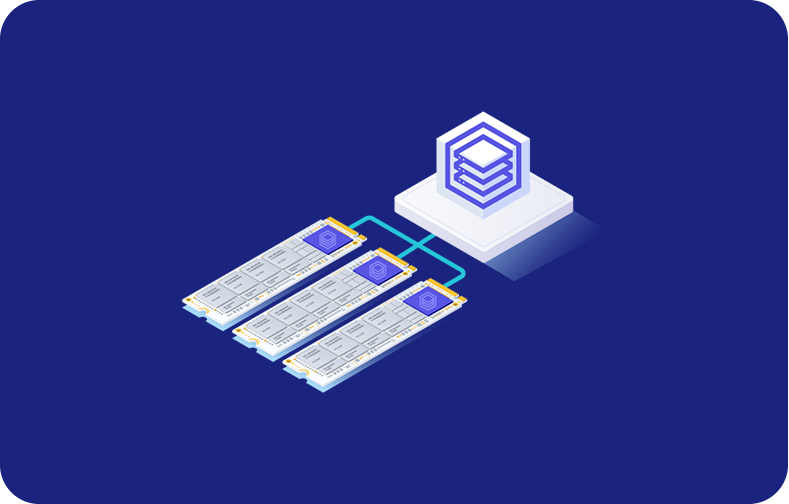Mastering Node.js: Exploring the Power of Server-Side JavaScript

For a number of years, JavaScript's influence was restricted to the Windows user's web browser. This limited developers who wanted to use a single language for both front-end and back-end development. With the advent of Node.js, a freely accessible runtime software based on Google's Chrome V8 JavaScript engine, a thankfully groundbreaking new alternative became available.
This content delves thoroughly into the world of Node.js, examining its fundamental features, benefits, and the reasons for its rise to popularity among developers throughout the globe. Therefore, this post will provide you with the information to fully utilise Node.js and advance your online apps, regardless of your experience level as a developer or where you are in your path.
What Is Node.js Written In?
Node.js is primarily crafted using a blend of C, C++, and JavaScript. With Node.js, you have the power to manage different versions effortlessly using tools like the node version manager (nvm), ensuring compatibility and flexibility in your development environment. Leveraging various node packages and the node package manager (npm), you can streamline your workflow and access a plethora of resources to enhance your projects.

Additionally, tools like brew uninstall node and brew upgrade node install node offer convenient ways to manage installing node on your system, while nvm install node simplifies the installation process of installing specific Node.js versions.
Whether you're coding on a Windows, macOS, or Linux operating system, Node.js provides a consistent and reliable platform for creating web servers and executing JavaScript code. Its versatility extends to handling diverse tasks, from setting up web servers for hosting applications to executing JavaScript code seamlessly through the command prompt.
While Node.js itself is written in JavaScript and C/C++, to get started building your own Node.js applications, you'll need a reliable and robust hosting platform. VPSServer offers a variety of Virtual Private Server (VPS) plans specifically optimized for Node.js development. Our 100% SSD storage and global server locations ensure top-notch performance and scalability for your applications. With VPSServer, you can focus on writing brilliant JavaScript code, leaving the infrastructure worries behind.
Node.js Architecture and How It Works
This latest Node.js version is a total game-changer, completely transforming the landscape of web app development. Its emphasis on lightweight architecture, extensive package options, and efficient handling of tasks asynchronously revolutionizes how developers create and deploy applications.

Whether you're an experienced developer or a beginner taking the first steps into programming, installing Node..js stands as a solid groundwork for building applications that can handle extensive operations, ensuring smooth performance and aiding in the advancement of the internet.
Node.js operates using a single-threaded, event-driven architecture, ensuring outstanding efficiency in managing asynchronous I/O operations.
Features Of Node.js
By keeping your apps current and robust, updating npm version of the latest Node.js to the most recent version guarantees that you take advantage of the most recent features, improvements latest features, and security updates.
When combined with npm, installing Node.js gives developers the ability to experiment with third-party tools and packages, which improves the features and functionalities of their apps. Developers may quickly and easily include third-party tools and libraries into their projects, increasing possibilities and speeding up development, by utilising node.js and npm extensive ecosystem.
Whether you're developing for real-time apps, IoT devices, or web servers, Node.js provides a flexible and reliable platform to realise your vision.
Easy
Node.js ships with a potent tool known as npm, short for Node Package Manager. This manager enables developers to seamlessly discover, fetch, and integrate pre-built modules and libraries into projects. This extensive collection of reusable components minimizes the need to create everything from scratch, thus saving precious development time. npm simplifies the task of handling project dependencies.
Developers can ensure the presence and compatibility of all required components, thereby preempting potential issues in the future. By providing a cohesive language and a reliable package manager, Node.js streamlines the development workflow, reduces intricacies above code, and empowers developers to concentrate on crafting innovative applications.
Speed
Node.js adeptly manages a significant influx of requests, proving invaluable for high-traffic applications. Users experience minimal latency and swift response times, enhancing their overall experience.
Scalable
Inherently scalable, Node.js applications adeptly handle thousands of concurrent connections with minimal system resource overhead, guaranteeing seamless scalability as user demands increase. Features like the Cluster module further improve system scalability by distributing incoming connections across multiple Node.js processes.
Maintainable
With its modular architecture and extensive package ecosystem, Node.js encourages code reusability following code, and maintainability following command, making development more efficient and debugging easier.
Packages
Node.js benefits from a wide array of pre-built modules and packages, accessible via the npm package manager. This expansive ecosystem empowers developers to utilizing pre-existing, thoroughly tested code, enables them to drastically cut down on development time and resources.
Multi-platform
Node.js applications can be deployed across various environments without the need for a source code or adjustments specific version two. This simplifies the deployment process and minimizes development complexities. Node.js applications can cater to a wider audience, as they function consistently across different operating systems.
Strong Backend
Node.js stands as a robust backend technology, providing a powerful toolkit for developing server-side applications. Node.js is proficient in constructing efficient and scalable APIs and microservices, making it well-suited for modern web architectures that demand modular and adaptable backend components.
Node.js offers a diverse array of libraries and tools tailored to address a wide range of backend development requirements. Developers can leverage Node.js to create web servers, RESTful APIs, or intricate backend services with ease.
Applications Of Node.js
Node.js excels in various application domains due to its unique capabilities. Here's a glimpse into some areas where Node.js truly shines:

Internet of Things
IoT applications are a good fit for Node.js since it allows for seamless connectivity in IoT ecosystems and real-time data transmission across connected devices.
Data Streaming
Node.js excels above command, in handling data streaming tasks, such as processing large files or facilitating real-time media and file streaming, thanks to its efficient event-driven architecture.
Complex Single-page Applications (SPAs)
When combined with Express.js and other frameworks, Node.js is the perfect tool for creating intricate SPAs that have dynamic content and smooth client-server interaction, all while improving user experience.
REST API-based Applications
Efficient data sharing and seamless interaction between frontend and backend systems are made possible by Node.js's strong architecture for creating RESTful APIs.
Real-time Chats
Node.js provides inexpensive as well as elevated frequency real-time chat apps, facilitating user-to-user communication through the usage of technologies such as WebSockets.
Is Node.js A Programming Language?
Instead of being an independent programming language, Node.js is a processing platform for running JavaScript code. This unique feature makes JavaScript more flexible than it has ever been outside of the web browser, allowing developers to leverage their prior knowledge to construct server-side applications and more.
Developers can take advantage of JavaScript's features with Node.js to build scalable and efficient server-side applications. Its extensive package ecosystem, managed by the package manager for node (npm), offers a plethora of already constructed modules and plugins to accelerate and increase productivity during development.
It uses Google Chrome's V8 JavaScript engine to execute JavaScript code. Node.js and npm (Node Package Manager) enable developers to work with external tools and packages, enhancing the features and functionality of their projects.
Using node.js and npm's vast ecosystem, developers can quickly and simply include external resources and tools into their applications, expanding possibilities and accelerating development. Node.js offers a dependable and adaptable framework to realise your ideas for Internet of Things (IoT) devices, web servers, and real-time applications.
Is Node.js Frontend Or Backend?
Node.js is primarily used in the database layer for scripting on the server and application development, but it breaks through conventions by being flexible enough for frontend and backend work. For developers constructing front-end interfaces or back-end logic, its huge package ecosystem, rich capabilities, and easy connectivity with several operating systems make it the go-to solution for developers globally.
A stable framework for developing server-side apps, APIs, and microservices is provided by Node.js, making it an excellent backend technology. Because of its autonomous I/O operations and dependent on events design, it is highly suitable for managing delayed jobs and effectively handling simultaneous interactions.
With Node.js, developers can build extremely scalable web servers that require less overhead in terms of resources to manage thousands of simultaneous connections. Developers may fulfill the needs of current web development by creating web server front-side programs that are efficient and responsive by utilizing the asynchronous nature of Node.js. Developers can improve workflow efficiency and dependency management with the help of tools like node package manager (npm) and node version manager (nvm).
Package management, version control, & infrastructure preparation are made easier with the help of these technologies, which guarantee a productive development process. Although Node.js is more commonly linked to backend development, frontend development workflows can also benefit from its use. Frontend development projects can be made more efficient by using Node.js to streamline production procedures, handle dependencies, and host development servers.
Developers can automate monotonous operations like bundling JavaScript files, generating CSS, and optimizing images with the latest Node..js-based construction programs like Webpack and Gulp. Developers can increase efficiency and optimize their construction procedures by utilizing Node.js's capabilities.
Productivity and Developer Efficiency
The use of a single language (JavaScript) for both frontend and backend development with Node.js significantly boosts developer productivity. Context switching between different languages is minimized, allowing developers to focus on core functionalities. The extensive ecosystem of Node.js libraries and frameworks further speeds up development by offering easily accessible solutions for typical tasks.
Reusability
Because of its flexible structure and npm ecosystem, Node.js prioritises code reuse over self-coding, reducing programming workload and time and fostering developer collaboration. Using back-end platforms like Node.js and front-end platforms like React or Vue.js, developers may swap out components and functionality.This simplifies the development process and minimizes the repetition of code.
Huge Community
The popularity of JavaScript has fostered a massive and vibrant developer community around Node.js. This translates to readily available resources, tutorials, and support when needed. Developers may overcome obstacles and quickly find solutions by using forums, online communities, and an abundance of documentation. The Node.js ecosystem's strong community fosters ongoing innovation by giving developers access to state-of-the-art tools and modules that help them stay ahead of the game.
Supercharge Your Node.js Projects with VPSServer
A fundamental component of modern web programming, Node.js offers unparalleled adaptability, efficiency, and scalability for developing creative applications. The popularity of Node.js amongst programmers has a justification. It has strong features, a vast toolkit of pre-built code (packages), and operates flawlessly across a variety of operating systems.
With the blazing-fast virtual private servers from VPSServer, you may improve your Node.js development experience. Utilize the state-of-the-art infrastructure of VPSServer to host and execute your Node.js apps and enjoy unmatched performance and dependability.
Give up worrying about downtime and slow load times in favor of a smooth development workflow with 24/7 support and enterprise-grade security. VPSServer gives you the ability to grow easily, whether when developing a high-traffic platform or a small-scale application, so your Node.js projects succeed.
Frequently Asked Questions
How do I install Node.js on my Windows system?
The MSI installer for Node.js on the corporate Node.js website can be used to install the framework on Windows. To finish the installation procedure, just download the installer, launch it, and adhere to following instructions in the on-screen directions.
What is npm?
It refers to the node Js package manager as Node Package Manager, or npm. It is the integrated package manager for Node.js and includes a command-line interface along with a web-based database of private and public packages.
How do I update npm installed Node.js to the latest version?
The Node.js version available on your system can be upgraded with package managers like npm or nvm (Node Version Manager). To obtain and configure the latest version or update, all you have to perform is execute the relevant programme.
What distinguishes Node.js from standard server-side frameworks like ASP.NET or PHP?
The Question shows research effort as most server-side solutions that use a synchronous, blocking approach, Node.js operates asynchronously, processing several requests simultaneously while requiring each one to finish. Node.js is particularly efficient since it doesn't stall, particularly for tasks requiring a lot of input/output.
Is Node.js suitable for beginners?
Yes, Node.js can be suitable for beginners due to its simplicity and extensive documentation. However, a basic understanding of JavaScript is recommended.












